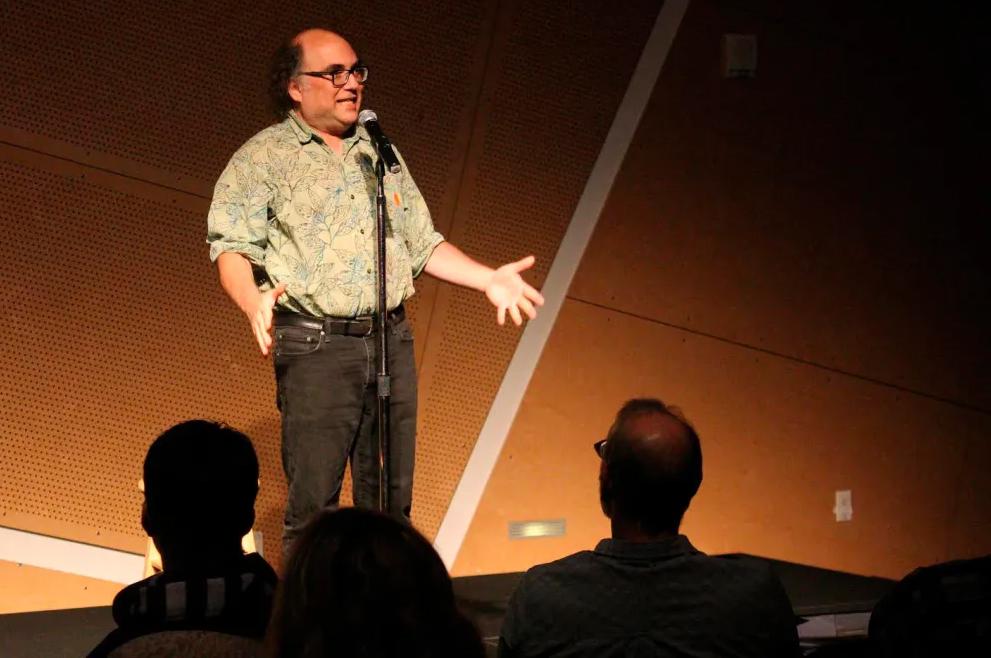Talking death over dessert at the Contemporary Jewish Museum
Death is not the most savory topic for the dinner table, but four storytellers recently made the discussion more palatable during an evening event at the Contemporary Jewish Museum in San Francisco.
At “Death Over Dessert” on July 13, Sara Faith Alterman, Elizabeth Sale, Julia Weber, and Josh Kornbluth weaved stories of their friends and loved ones who had passed, drawing an audience of a diverse age group that chuckled and got teary eyed over the heartfelt accounts.
“Before I die, I’d like for one more time to go to the lunch special at the Olive Garden,” said Berkeley monologist Josh Kornbluth during his set about the last wishes of a woman with advanced breast cancer.
Hospice doctors had given the woman only five days to live, but when she surpassed that, she added a new wish to her short bucket list: She wanted to experience the Italian restaurant chain’s bottomless bowl of salad one more time.
“What can I say Josh? It’s refreshing, it’s … it’s crispy,” Kornbluth recounted.
“Death Over Dessert” — so named for the sweet treats served that night — was a twist on “Death Over Dinner” events created by entrepreneur Michael Hebb, who felt important conversations about the uncomfortable topic didn’t happen often enough.
And he’s not off the mark: Gallup reported in 2016 that 66 percent of Americans did not have a will, a number that rose from 2005, when 51 percent of the U.S. population didn’t have one. U.S. News reported just this month that two out of three Americans don’t have advance health care directives, which tell family what to do if their loved ones become incapacitated and can no longer make coherent decisions about their healthcare.
It’s in part due to these statistics that inspired Reboot to create a “Jewish Edition”-spin to Hebb’s events that brought to the conversation rabbis and theologians.
New York-based Reboot, which describes itself as a “cultural nonprofit affirming the value of Jewish traditions and creating new ways for people to make them their own,” debuted “Death Over Dinner” events in the Bay Area last year, said Reboot spokesperson and San Francisco program coordinator Tanya Schevitz.
Local residents have received the series positively, Schevitz said, because “death is the topic of the moment.”
“As people live longer, we’re starting to think more about the end of life and talking about it more often,” she said. “People used to avoid the conversation about how you want to die, but also how you want to live.”
At the CJM, after the storytellers gave their spiels, the sold-out event took on a Sunday school-esque vibe, with attendees dividing into small groups and discussing Reboot survey questions with each other on topics such as where they wanted to be when they died, and what arrangements they had made for the end of their lives.
Small desserts and wine were served.
“We made dessert because it would have been a pretty big dinner for a hundred people,” Schevitz said. But, she noted, upcoming plans include a dinner Oct. 30 at Congregation Sherith Israel and a full dinner in collaboration with the Jewish Community Center of San Francisco in January 2018.
Simona, a teenager who attended the CJM event with her family, said in a survey response that she “loved the conversations.”
“I haven’t had a lot of experience with [death] myself, thankfully, beyond the death of all my fishes,” she said. “That’s a lot of fish.”
“The topic itself it is very heavy and not something I would be talking about normally, but it is a necessary conversation eventually,” Simona added.
An anonymous respondee said the performers’ candor “made it easier for people to enter into this conversation, so I think that was a good way to loosen people up and get them thinking about it.”
In Kornbluth’s story — in which he and the dying woman, along with a friend from hospice, finally make it to the Olive Garden — he described his dying friend as someone going through something totally normal, implying to the audience that facing death shouldn’t be as uncomfortable as so many people make it out to be.
“We were talking and laughing, and I realized: we weren’t two healthy people and one sick person. We were three people — friends — having the lunch special at the Olive Garden,” Kornbluth said.
“We’re all finite. I am finite. You are finite,” he said. “But the bowl … the bowl is bottomless.”
This story originally appeared in Jewish Weekly here.

Leave a Reply